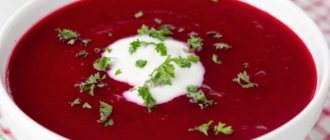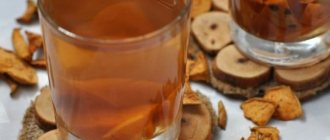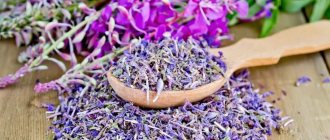Allergenic fruits during breastfeeding
During breastfeeding, a woman needs to monitor her diet. Usually the whole family switches to healthy foods to make it easier for the young mother to navigate the variety of foods.
But not all healthy foods are good for a growing breastfed baby. Even during pregnancy, many mothers have already studied the list of foods that cause them serious allergies.
When a child is born, the fear becomes even greater, since any harmless, familiar fruit can provoke allergic reactions in the form of local and widespread rashes, lacrimation and even fever.
Allergies for a nursing mother can trigger allergies in a baby
. Children under 6 months of age, when the first feeding period has not begun, become especially susceptible to allergies. What fruits can a nursing mother eat?
The main allergenic fruits include the following:
When and in what quantity can a nursing mother drink juice?
Strong allergens, such as chocolate, strawberries or peanuts, are usually introduced into the diet of a nursing mother no earlier than six months of age. The same applies to orange juice - this time is the safest and with a high degree of probability such a drink will not lead to an allergic reaction.
If you wish, you can try introducing orange juice after the baby reaches three months of age, but not earlier, since until this moment the baby's digestive system is not yet so well developed.
It's best to start with a quarter glass. After drinking the juice, monitor your baby - if after 8 hours you do not observe a negative reaction in the form of redness or restless behavior, then most likely it will no longer occur. To be on the safe side, you can wait two days, after which you should double the volume of juice and monitor the child again.
You are allowed to drink no more than half to one glass per day. It is best to do this once a week, but if desired and the baby does not have an allergic reaction, you can increase the amount up to two times.
Fruits and stomach pain
The lactation period is accompanied by no less digestive problems than pregnancy.
The main unpleasant symptoms are diarrhea, bloating, and heartburn.
A phenomenon such as milk stagnation is also possible. You can find out about this link.
Abdominal pain occurs as a result of the conversion of carbohydrates, acids and proteins into glucose, which can provoke fermentation in the stomach. The fermentation process causes increased gas formation and discomfort.
After reading such warnings, parents have the right to ask: what fruits can a nursing mother eat? It turns out that the choice is extremely limited?
In addition to the manifestations of symptoms in a nursing mother, digestive problems naturally arise in the baby. Infants are most exposed to this in the first months of life.
To eliminate discomfort in the gastrointestinal tract in mother and child, the following fruits should be excluded:
- apples (the increased content of fruit acids and pectin increases natural fermentation in the cavity of the stomach and intestines);
- grapes (causes flatulence and bloating);
- plums (known for their laxative effect);
- some varieties of pear (loose stools, bloating).
Laxative fruits can be eaten when there are severe problems with stool (prolonged constipation, difficulty defecating in mother and child). For example, plums and pears can be a natural laxative.
It is worth noting that all fruits and vegetables should be consumed in moderation. 1-2 fruits per day are enough to satisfy the body’s own needs for vitamins and beneficial microelements.
Many mothers during lactation take vitamin complexes and biological supplements to fortify milk, so additional vitamins can cause excess and lead to some diseases.
How to choose
A nursing mother should choose tangerines with special care. We buy the “right” fruits:
- Healthy fruits have a uniform bright color and no black spots on the skin.
- Pores are clear. When pressed, juice sprays out of them.
- Tangerines should be dense and heavy. If the peel is too soft, the tangerine is not fresh.
- The fruit has a pleasant fresh aroma. If you smell dampness, it means the rotting process has begun.
- Bright orange fruits tend to be sweeter than light orange fruits.
Exotics during lactation

Even during pregnancy, many women think about the health of their own child, so they consider it appropriate to eat a variety of fruits in large quantities.
Of course, all fruits, to one degree or another, have beneficial biological compounds that are useful during breastfeeding, but excessive consumption of exotic fruits is undesirable.
Pineapple causes severe allergies when breastfeeding
, and coconut, despite the benefits of coconut milk, can cause colic. A pediatrician who knows the general clinical history of the mother and child should tell a nursing mother what fruits she can eat.
It is worth knowing that you should abstain from some fruits altogether, at least until your child reaches 12 months:
- papaya, mango, pineapple (fragrant fruits contain natural enzymes that can provoke extensive allergic reactions in mother and baby, so the question of whether a nursing mother can eat pineapple resolves itself);
- bananas (an exception for nursing mothers, so eat);
- avocado during breastfeeding (if the mother eats avocado, the baby may experience severe colic);
- coconut. Coconut during breastfeeding may be indicated for constipation, but it should not be used due to the development of colic in the baby. Pediatricians should tell young mothers in more detail whether coconut can be consumed while breastfeeding.
With a special love for fresh pineapples, many nursing mothers resort to an alternative - a canned product.
So can a nursing mother have canned pineapples? The answer is clear - no.
Even after preservation, pineapples retain their chemical composition and can provoke allergic reactions. Not a single exported fruit or berry can survive a long journey, so many are initially treated with chemicals for presentation.
The beauty of exotic fruits is very attractive, but one cannot rely on aesthetic perception alone.
What kind of fruits can be eaten while breastfeeding is an obvious question - healthy, but you should not rely on the benefits of exotic ones. Consumption of exotic foods is possible only after the end of lactation.
In addition, it is a proven fact that fruits from their region are easier for the stomach to tolerate
and do not create problems with natural digestion.
How to introduce it into the diet of a nursing woman
When answering the question whether a nursing mother can eat tangerines, an important criterion should be taken into account: tangerines should not be consumed until the baby reaches 3 months of age. Until this age, a baby’s stomach is absolutely not adapted to digest citrus fruits. Some experts advise starting to use them when the baby is 5 months old.
Tangerines should be administered in small portions during breastfeeding. Eat a small slice of the fruit, always in the first half of the day. Observe the baby's reaction after feeding for three days. Avoid eating any new foods during this period. Your task is to identify an allergic reaction in your baby specifically to citrus fruits. If your baby develops a red rash or colic, consult a specialist.
If after three days the baby does not show any negative consequences, you can eat 2 small slices of tangerine and continue observation. If the baby’s reaction is normal, continue to increase the dose by 1 slice once every three days.
Remember that a nursing mother should eat tangerines with caution. The maximum consumption rate for a normal child reaction is no more than 1 medium fruit per 3 days.
Minimal negative consequences are observed in those breastfed babies whose mothers ate no more than 2-3 medium fruits per week. The fact is that there is a concept of a so-called cumulative allergic reaction. A child’s body can accumulate certain substances and when there is an excess of them, an allergic reaction begins, which manifests itself as itching, rash, redness or disorders of the digestive system.
Seasonal fruits during lactation
Seasonal fruits from the region where you live are much safer than exotic
fruits. Seasonal fruits are the period when berries and fruits contain high concentrations of useful microelements and compounds (ripening).
Watermelons and melons on store shelves in winter should not attract a nursing mother.
This is contrary to the natural process and indicates the treatment of fruits with various chemical fertilizers. This relates to the question of what fruits you can eat after childbirth.
Seasonal fruits can be consumed depending on the age of the baby:
- What fruits can a nursing mother eat in the 1st month
: bananas, peaches, nectarines. A few fruits a day are enough to enrich milk with silicon and provide the child with a normal amount of vitamins. - Allowed fruits for a nursing mother at 2 months
: persimmons, figs, bananas, apricots.
5-6 apricots will be enough for a nursing mother to receive the required amount of iodine, hemoglobin, fiber and other microelements. Fruits for a nursing mother in the first month should be chosen especially carefully
. For a baby, figs can serve as a natural anti-inflammatory agent. - Fruits for breastfeeding from the 3rd month
: pomegranate, currants, cherries (from your own garden), cherries, strawberries, watermelons, melons. An increased content of vitamin C will be the best way to increase the body's immune response to external pathogens of various diseases. The child has already grown up and is much stronger, so the risks of allergies are minimal. It is important to maintain moderation in portions. For example, 30 ml of freshly squeezed pomegranate juice is enough to satisfy the daily requirement for vitamin C. - Fruits from six months or more
. Here you can relax a little and gradually introduce citrus fruits (oranges, tangerines, grapefruit) into your diet. During the autumn-winter period, a nursing mother needs the body’s natural protection, and the baby’s immune defense is already capable of reflecting the negative effects of some allergens.
Moderation is important in everything. If a nursing mother has had allergic reactions to any fruit during or before pregnancy, then you should not try it during the lactation period.
What fruits can be used during breastfeeding is determined by the method of exclusion
: what is not possible is automatically possible. Despite the obvious benefits for the child, it is worth finding the best alternative among the abundant assortment of seasonal fruits.
Citrus fruits for breastfeeding
Through breastfeeding, the baby gradually becomes accustomed to all unfamiliar foods. The only condition:
- strangers,
- allergenic,
- exotic,
- questionable foods should be introduced into the diet of a nursing mother gradually and in small portions.
Oranges during breastfeeding, eaten in large quantities, can cause skin rashes, diarrhea, colic and even poisoning in a child. For information on how to get rid of colic, see the course Soft tummy >>>
If you yourself do not suffer from an allergy to citrus fruits and ate oranges during pregnancy, you can gradually introduce citrus fruits or orange juice into your diet while breastfeeding, starting at 6 months.
Symptoms of a fruit allergy
An allergy in a nursing mother may be completely asymptomatic or may be expressed by slight redness of the hands. Doctors note a wider list of signs that may indicate an allergy to fruits:
- extensive rashes on the skin (pointed or wide spots protruding above the surface of the skin or even in texture, multi-shaped or even, etc.);
- stool liquefaction;
- sneezing, increased lacrimation;
- redness and itching of the skin at the site of the lesion (in children, allergies often manifest themselves in the form of diaper dermatitis and are localized between the legs, on the elbows, and on the back of the head in the form of diaper rash).
In more severe cases, fever, chills, and difficulty breathing may occur. If symptoms become more serious, you should immediately seek qualified help.
The pediatrician should help the mother choose the right foods and tell her which fruits are ok while breastfeeding.
Allergies in the form of a rash are not the only reasons why it is important to exclude foreign fruits and those sold out of season from the mother’s diet.
Chemical fertilizers quickly penetrate the blood into mother's milk, negatively affecting the baby, poisoning the body with pesticides and toxins.
Habitual fruits should be eaten in moderation; any excess can harm the child’s fragile stomach and cause digestive disorders in the mother. Any changes in the well-being of mother and child should be a reason to consult a doctor
.
Fruits are the main source of vitamins in the human diet. They are very necessary for both the mother and the baby for recovery after pregnancy and childbirth. Its development in the first years of life is very active, and vitamins play a leading role in this process.
Parents often complain that their children do not like fruits and vegetables. Today, many experts argue that a person’s taste preferences are formed during the period of intrauterine development. This means that in order for the child to happily gnaw on an apple in the future, and not ask for candy, the mother must include fruit in her menu both during pregnancy and, of course, during breastfeeding.
To replenish the need for vitamins, a woman during lactation needs to eat 200-300 g of fruit. They should be introduced into the diet after childbirth gradually, in small portions, taking a break of 3 days before adding a new fruit to the menu. This is important to monitor the child’s reaction to the product. Fruits are often the cause of food allergies. Consider seasonality, give preference to what grew in your region. You can drink freshly squeezed juices, but fruits in their natural form are healthier, as they contain dietary fiber that is important for the gastrointestinal tract.
Apples
The first fruit that a mother can eat after giving birth (it’s better to bake it first, this will help not provoke gas in the baby). Start with green fruits; if the child reacts normally to such apples, you can eat yellow ones and, with caution, red ones (it is advisable to peel them, like all red fruits, they are the most powerful allergens). Apples are an important source of iron, calcium, magnesium; apple grains contain a lot of iodine.
Bananas
These are the only exotic fruits that can be eaten without fear. They are a good source of energy and endorphins, which mom really needs. Bananas contain a lot of potassium, magnesium, folic acid, and B vitamins. It is best to eat fruits of medium ripeness - not green or overripe.
Pears
These fruits should be introduced into the diet later (at 3-4 months). They are rich in potassium and folic acid, help increase hemoglobin and cope with gastrointestinal disorders. Most varieties are hypoallergenic. It is better to choose green fruits. Like apples, it is recommended to peel the fruit and eat baked pears at first.
Peaches, apricots
These stone fruits are useful for mom, if only because they have a very beneficial effect on her nervous system - they increase stress resistance and improve mood. They are also high in beta-carotene, which is very important for the immune system. In addition to fresh fruits, it is useful for a nursing woman to include dried apricots in her diet.
Plums
The main advantage of this fruit is its laxative effect. But don't forget about moderation! Large amounts of this fruit can cause irritation of the intestinal mucosa.
Watermelons, melons
You can eat them (as they increase lactation), but with caution and only in late summer and autumn. The first watermelons and melons are usually grown with large amounts of chemical fertilizers to speed up ripening.
During breastfeeding, you should eat citrus fruits (lemons, oranges, tangerines, grapefruits, limes) and exotic fruits (kiwi, mango, pineapple, papaya) with caution - children often have an allergic reaction to them. The same applies to red berries (strawberries, wild strawberries, raspberries). But the child’s body, as a rule, reacts well to berries of a rich dark color, so cherries, black currants, and blueberries are quite acceptable in the diet of a young mother.
A nursing mother should receive the full amount of necessary substances and vitamins.
This is only possible with a balanced diet, which is unthinkable without fruits. And if there are no complaints about our “native” apples, then what about the abundance of other fruits? After all, fruits that are very healthy, rich in microelements and seem to be already familiar can harm the baby. We offer a number of principles that a young mother should adhere to when creating her menu.
It's no secret that the nutrition of a nursing mother is often significantly different from the nutrition of other people. Pregnancy, childbirth and the next few months after childbirth take a huge amount of strength from her, so she needs to replenish the body's resources. By consuming fruits during breastfeeding, a mother provides herself and her baby with the necessary vitamins.
Chemical composition and beneficial properties of orange
It is useful to eat orange during pregnancy and breastfeeding, and all because of its composition, which contains:
- vitamin A - has a positive effect on visual acuity, improves cell regeneration, fights free radicals, and has a powerful antioxidant effect;
- vitamin B1 - normalizes the functioning of the cardiovascular, nervous and digestive systems, stimulates brain activity, prevents the development of neuritis, polyneuritis, peripheral paralysis, helps cope with postpartum depression;
- vitamin B2 - protects the retina from the harmful effects of UV rays, improves visual acuity and adaptation in the dark, is important for the normal breakdown of fats, proteins and carbohydrates;
- vitamin B5 - participates in the formation of antibodies, improves the absorption of other vitamins by the body, activates the production of adrenal hormones;
- vitamin B6 - prevents sudden surges in blood glucose, stabilizes metabolism in brain tissue, improves memory, increases performance, normalizes the balance of sodium and potassium in body fluids;
- vitamin B7 - takes part in carbohydrate and protein metabolism, improves the functioning of the nervous system;
- vitamin C - strengthens the immune system, protects the body from bacteria and viruses, regulates hematopoiesis, participates in collagen synthesis;
- potassium - regulates fluid balance at the cellular and intercellular level, balances the water-salt balance, has a positive effect on intestinal motility;
- silicon - regulates proper bone mineralization, strengthens red blood cells, prevents the development of atherosclerosis, restores the nervous system;
- cobalt - regulates the functioning of the nervous system and metabolic processes, restores the activity of the pancreas;
- copper - takes part in the production of collagen, has an anti-inflammatory effect, protects bones from fractures;
- zinc - strengthens the immune system, has a positive effect on vision, stimulates brain function, and improves mood;
- magnesium - has a beneficial effect on the emotional state, removes toxins, improves the regeneration of soft tissues, regulates blood glucose levels, and has a beneficial effect on the growth of bone tissue.
The calorie content of citrus is only 43 kcal per 100 g of product, which means that you can eat it without fear of gaining excess weight.
Do no harm: how to avoid allergies and not provoke colic
Before the baby turns one month old, we select fruits by elimination:
- By color:
remove red and orange fruits from the diet. The pigment that gives them their bright color provokes allergic skin reactions - rashes, spots. An exception may be a red apple, if you first remove the skin. - By type:
exclude citrus fruits. Their high vitamin C content makes them strong allergens. You can only add a small slice of lemon to your tea. - According to the degree of impact on the intestinal microflora:
grapes, plums, some varieties of pears. They cause bloating and flatulence. You can also expect a surprise from plums in the form of a strong laxative effect, which is completely undesirable for a small organism (but during constipation in a mother or baby, plum can just come to the rescue).
Down with the exotic, let's eat our own
Fragrant exotic fruits (papaya, mango, pineapple) and the citrus fruits already mentioned above are not harmless due to their foreignness to our region. Example: in sunny Spain, oranges and tangerines are in first place in the diet of mothers and in complementary feeding of children. For them, this is a lesser allergen than the same cereals containing gluten. But for Russia, especially central Russia, this is still exotic and a certain risk. The exception is hypoallergenic bananas, which Russians have enjoyed eating since childhood.
The benefits of an apple from your own garden, in comparison with an exotic fruit arriving from overseas, are obvious: the first option is much more expedient and nutritious.
It has been proven that the human body assimilates fruits that are characteristic of the specific region in which a person lives faster and better.
But it is wrong to exclude “non-native” fruits from the diet entirely. It is through mother's milk that the child becomes acquainted with all food components. And subsequently, during the period of feeding the baby, in particular with fruits, it will be much easier. The child will already get used to the components of various fruits previously eaten by the mother and will accept them without unwanted reactions, and the mother also gives away with the milk the protective mechanisms that she has already formed against potential allergens.
Exotic fruits, by definition, are imported and the conditions for their transportation are far from ideal. Not a single fruit or berry can survive a long journey if it is not first treated with chemicals for better storage. And if you dare to bite into a foreign forbidden fruit, then do it little by little and not in the first month of the baby’s life. It is better to remove the peel and first wash the fruit itself in a baking soda solution.
Note to moms!
Hello girls) I didn’t think that the problem of stretch marks would affect me too, and I’ll also write about it))) But there’s nowhere to go, so I’m writing here: How did I get rid of stretch marks after childbirth? I will be very glad if my method helps you too...
Seasonal fruits - the choice of a caring mother
Showcases and shelves of supermarkets and markets delight our eyes with a variety of fruits all year round. A nursing mother should be on alert and think: where did the juicy blueberries or alluring raspberries come from in January? On the box we will find the answer - Chile (or some other distant “banana” republic). We mentioned the harmful costs of transporting overseas fruits and berries above. And unpredictable
What
effect will chemical compounds penetrating into breast milk have on the baby’s fragile body?
As for seasonality, it is worth listening to the opinion of experts: most fruits have a clear ripening time frame and in “their” season they contain more vitamins and nutrients. The taste of fruits during natural ripening is also better.
Here is a list of seasonal fruits and berries that are very useful for breastfeeding
:
- Cherry (white, yellow), from May to August. You can use it from the first day.
- Currants (red, black). It contains a lot of vitamin C, which is why it is a potential allergen. After the third month, you can introduce fruit drinks based on it, and then the berries themselves.
- Nectarines, peaches, mid-July-September. They are rich in silicon, which is why they improve metabolic processes. You can try it at first, the main thing is to monitor the child’s reaction.
- Figs, from June to September. It has an antipyretic agent, increases the body's resistance to disease, which is important during breastfeeding, when nursing mothers have a limited list of medicines in reserve.
- Persimmon, from October to December. Excellently increases hemoglobin and saturates with iodine. It is better to introduce fruit into the diet when breastfeeding after three months, but this fruit is not suitable for complementary feeding: it is fraught with intestinal obstruction in the baby.
- Pomegranate. From September to the end of December. Pomegranate juice (diluted) in moderation will only enhance your mother’s diet. It is better to abstain for up to a month, and then try to administer it; a single portion should be no more than 30 ml.
When the soul knows its limits
New fruits (also juices and fruit drinks) should be introduced into the mother’s diet gradually, one new product at a time over 3 days. It is advisable to eat a small slice in the first half of the day; the baby’s reaction (if any) will appear in the evening. If a suspicious reaction (spots or rashes on the skin, peeling, dry skin) does not take long to appear, then you should exclude the use of this fruit for a period of one month, but then try again. The baby's digestive tract matures gradually and it becomes easier for him to get used to a new product. If everything is fine, we eat calmly, the average daily portion per breastfeeding for fruit is 200-300 grams.
It is important to take into account your own individual intolerance: if before or during pregnancy some fruit caused rejection, you should not stuff it now, even if it is very healthy.
You should understand: your baby is unique, his reaction is unpredictable. Some children calmly “digest” strawberries, while others get sprinkled and bloated by the neutral pear. But it is worth adhering to general recommendations, because severe allergic reactions in early childhood are the cause of more complex diseases (atopic dermatitis, allergic asthma). Therefore, you need to clearly separate which fruits are allowed and which are not.
So, as a conclusion, below are lists of allowed and not recommended fruits during breastfeeding.
- Apples
. Ideal option for breastfeeding. They contain a large amount of fiber and provide iron, calcium, magnesium, and iodine. Fills with energy, restores strength and has a slight laxative effect. Green apples are most often recommended, but if used with caution, all varieties can be eaten. It is recommended to eat apples after removing the peel, or even better, baked (bake, for example, in the microwave - the delicacy will be ready in 2-3 minutes), in order to avoid severe gas formation in the baby. Read more about ; - Pears
. The best source of folic acid, pectin, fiber for a nursing mother, they also contain a large amount of potassium, vitamins A, B9, C. You need to eat without peeling and with extreme caution, it can provoke colic in the baby; - Peaches
. Healthy fruits allowed during breastfeeding. They are rich in magnesium, it is a good antidepressant: it improves mood, stress resistance, balances the psyche, plus everything, it is an indispensable material for the development of the baby’s brain; - Apricot.
Rich in vitamins, microelements, beta-carotene - it is so necessary for the effective functioning of the immune system. Details about ; - Watermelon
. Due to its wateriness it improves metabolism. But there are also pitfalls here - modern watermelons are grown with the help of chemical additives, so it is better to limit their use or completely abandon them - more about; - Plum
. It is a good laxative, so if the baby becomes constipated, the mother can add some plums to the menu. But you shouldn’t get carried away with them, otherwise you can achieve the opposite effect – irritation of the intestinal mucosa and loose stools. In baby food departments you can find prune puree; - Banana
. An excellent dessert for moms: it has a lot of potassium, it stimulates the production of serotonin (the joy hormone) and is an excellent source of energy. It has a high calorie content and minimal fat content. An excellent snack to replenish energy (); - Berries
(cherries, gooseberries, cherries, currants) are a rich resource of antioxidants and vitamins and, as a rule, do not cause allergies in the baby. Most berries contain a sufficient amount of vitamin C to boost immunity and prevent colds.
Rules of use
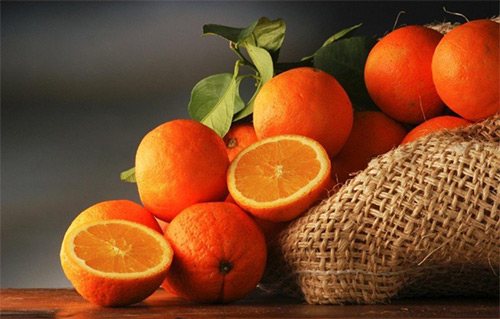
Breastfeeding women should eat oranges with caution, following some recommendations:
- It should be introduced into a woman's diet during lactation no earlier than the baby is three months old. It is better to wait up to six months, choosing alternative products with less allergenicity as sources of vitamins. By this time, a system for producing enzymes necessary for complete digestion of food is developing;
- Fruits should be washed thoroughly in warm water with the addition of soda to remove chemicals. Oranges are brought from other countries, and for better preservation they are treated with special solutions. Fruits are exposed to more aggressive effects in the off-season, when their ripening is required;
- The orange must be peeled and removed from the white film, which contains a large amount of allergen;
- The reaction to a new product appears within 6-10 hours after feeding. At first, it is better to try the exotic fruit in the morning. Throughout the day, you will be able to notice how digestion works, whether there are any rashes or redness on the skin. You should not eat the fruit at night because of possible bloating and colic in the baby;
- It should be included in the menu in small portions. For the first time, a small slice is enough; if the baby is not intolerant, the portion can be gradually increased to half an orange per day. But eating fruit every day is not recommended, 1-2 times a week is enough;
- Abuse of citrus fruits is unacceptable; it can lead to an allergic rash, digestive disorders, bloating, and in rare cases, poisoning;
- If the allergic manifestations are minor and do not have a strong impact on the child’s well-being, then you can try the orange again after a few weeks. Sometimes the cause is the immaturity of the digestive system, the functioning of which improves as the baby grows. In case of acute reaction of intolerance, swelling, change in skin color, deterioration of breathing, it is necessary to urgently call an ambulance;
- You can eat oranges while breastfeeding as part of confectionery and desserts, but they bring more pleasure than benefit. As a result of heat treatment, a significant amount of vitamins is destroyed; it is better to eat fruits fresh.
Proper consumption of small amounts of oranges during lactation contributes to their better absorption by the child’s body in the future. Together with mother's milk, the baby gains resistance to potential allergens.
Fruits not recommended in the first 3 months
- Exotic
(papaya, mango, feijoa, kiwi, etc.) can cause allergic reactions in a child. But the same kiwi is a source of vitamin E, which, unfortunately, is not found in all fruits. This antioxidant removes toxins from the body, normalizes the permeability of the gastrointestinal tract, and prevents the development of cancer in mother and child. In general, exotic fruits contain many vitamins, they are tasty and diversify the diet. However, it is not recommended to lean on them. Starting from the age of four months, you can include one such fruit in the menu and watch the baby’s reaction. If nothing bothers him, he can eat. But be careful - any excessive use will affect the child.; - Citrus fruits
(orange, lemon, lime, grapefruit, tangerine). The strongest allergens, they are recommended to be introduced from the 4th month of the baby’s life. Among the citrus fruits, the pomelo fruit is good for mothers; it is less allergic in comparison with its counterparts; - Grape.
The rich content of minerals and trace elements contributes to the full development of the skeletal system. But the risk of bloating in the baby is high, so you need to eat a little bit. Details about ; - Berries
(raspberries, sea buckthorn, strawberries and strawberries) are “known” allergens; you should also eat them in small quantities.
Breastfeeding mothers need a large amount of vitamins and minerals of various groups in order to maintain full functioning of both her and the child. Therefore, dear mothers, eat fruit, think about the baby’s safety, remember a sense of proportion, and everything will be fine!
What are the benefits of citrus fruits?
Exotic citrus fruits are among the top most allergenic foods. Fruits and berries grown in the region of residence rarely cause allergies, since our body has all the necessary enzymes to absorb the local product. A bright exotic fruit can cause allergies.
However, it never occurs to anyone to give up oranges or tangerines in everyday life.
After all, these citrus fruits are rich in:
- vitamin C,
- beta carotene,
- phytoncides,
- potassium,
- pectin.
Can, can't, reaction
Having gone through the difficult and exciting process of childbirth, mommy needs to adapt to the new rhythm of life almost immediately. Moreover, the changes will affect all its aspects, and nutrition in particular. After all, now everything that a woman eats enters the child’s body through milk. Fruits provide nursing mothers with a large complex of important vitamins, minerals, fiber and other beneficial substances.
Can a nursing mother eat fruit?
Doctors are of the opinion that everything that the mother’s body desires should be eaten. This is what makes it possible to add to your menu those fruits during lactation that you want at the moment. You should not submit to the pressure of family, friends and doctors, who unanimously claim that fruits during breastfeeding are an obligatory product in the mother’s diet. If you don't want to, don't force yourself!
The effect of fruits during breastfeeding
Their consumption very often causes allergic reactions in the baby, especially if a close relative has an aversion to certain types of fruit. Allergies, like other genetic diseases, tend to be passed on from generation to generation. Also, do not lose sight of the fact that some fruits are more harmful than beneficial for nursing mothers. For example, they can cause upset stomach, intestines, constipation, rashes and other “protests” of the body.
Rules for eating fruits during lactation
There are several simple rules that can reduce the risk of negative effects of fruits on the body of mother and child, as well as increase the degree of their usefulness. So:
- They should be included in the diet slowly and in small portions;
- monitor the response from the woman and the newborn;
- fruits for a nursing mother should be washed thoroughly and purchased from reliable and trusted places; the ideal option is fruits from your own plot;
- avoid consuming fruits on an empty stomach or after meat dishes;
- Monitor the amount of goodies you consume.
What fruits can a nursing mother eat?
As mentioned above, you can eat almost anything, the main thing is to observe moderation. It is better to give preference to familiar and “native” fruits, namely:
- apples, especially baked in the oven;
- pears, but you shouldn’t get carried away, as they often cause bloating and colic;
- peaches, because they are a storehouse of magnesium;
- watermelons, because this berry will help increase the amount of milk and speed up metabolism;
- plums, but they should be consumed dried or in compotes;
- bananas, which are a real “energy booster” for mother and child.
What other fruits can a nursing mother eat?
Don’t be discouraged when you see such a short list of permitted products despite the abundance that is offered. If you carefully monitor your baby’s reaction and consume everything in small quantities, you can expand it and add fruits such as:
- mango, kiwi, papaya - extremely healthy, but also allergens at the same time;
- grapefruit, tangerine, orange, persimmon - can cause bloating, but are a source of vitamins in winter;
- cherries, cherries, currants and gooseberries - in small portions;
- apricots and grapes are helpers in the “construction” of the baby’s skeleton.
What fruits should a nursing mother not eat?
Even an observing doctor will not be able to answer this question unequivocally, because what brings harm to one is a necessary component for another. Taboos on fruit consumption are mainly based on the huge content of pesticides, stimulants and other chemicals in them. Therefore, sometimes all “overseas” fruits may be banned. But not everyone has the opportunity to include fruits from their own garden in their diet.
A woman makes her own decision about which fruits to eat during lactation, based on her own intuition, observations and experience. And no specialist can tell you exactly which fruits are suitable for nursing mothers, because each person is individual, and everyone’s sensitivity to one or another component is different.
Grapefruit is a subtropical fruit belonging to the citrus family and known to the general public since the end of the 18th century, when it was first mentioned in the works of European botanists. There is information that this fruit is the result of a biological experiment on crossing a pomelo and an orange, but no documentary evidence has been found for this. Be that as it may, grapefruit is the most dietary citrus fruit of all representatives. In addition, it has pronounced beneficial properties of targeted action. In this regard, many are interested in the possibility of consuming fruit while breastfeeding. It is from this perspective that it is important to consider the use of this citrus.
Possible harm
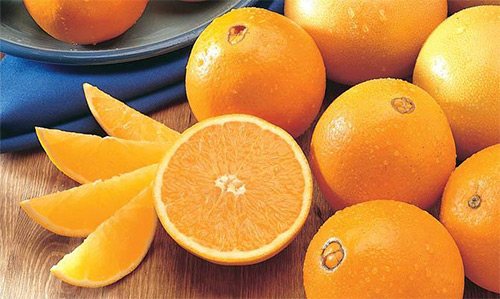
Exotic fruits are more likely to cause intolerance because our digestive system cannot always adapt to them. Due to the high risk of allergies in the baby, most experts recommend refraining from eating oranges during breastfeeding . The risk of intolerance to the fruit in a baby is reduced if the expectant mother regularly consumed it during pregnancy.
You need to exclude them from the menu if a woman has:
- Inflammation of the digestive system, gastritis with heartburn, increased acidity of gastric juice;
- Diabetes, pancreatitis – oranges contain large amounts of sugar;
- Poisoning - acids in citrus irritate inflamed mucous membranes;
- Kidney diseases - eating oranges increases the load on them.
There is no need to rush into introducing oranges into the menu of a nursing woman if one of your relatives is allergic to citrus fruits. In this case, there is a high probability of intolerance to the fruit in the baby.
In case of diathesis in an infant (hereditary predisposition to certain pathologies), all strong allergens, including citrus fruits, are excluded from the diet of the nursing mother.
Benefits of grapefruit during breastfeeding
- It has a beneficial effect on the hematopoietic system in the body as a preventive and therapeutic agent. Helps improve blood composition in mother and child. This effect is primarily due to the high potassium content in this fruit - up to 170 mg. Grapefruit juice lowers blood cholesterol.
- It is an excellent remedy in the fight against vitamin deficiency, which often occurs during lactation, since the female body’s immunity is weakened. Grapefruit contains large amounts of vitamin C (up to 50 mg) and riboflavin.
- Relevant use for low acidity of gastric juice, which is often observed during pregnancy and lactation.
However, grapefruit should be consumed with great caution while breastfeeding, as it can provoke a number of general and specific side effects. In this regard, it is important to familiarize yourself with the following recommendations.
Orange
The “sunny fruit” orange is also useful for a woman’s weakened body after childbirth. It contains a large complex of vitamins, micro- and macroelements. The list of beneficial properties of orange includes:
- increasing immunity;
- anti-inflammatory and antimicrobial effect;
- tonic effect;
- improvement of metabolism;
- suppression of rotting and fermentation processes in the intestines;
- strengthening intestinal motility and combating constipation, which affects many women after childbirth.
There are also contraindications to consuming this fruit:
- allergic reaction;
- peptic ulcer of the duodenum or stomach in the acute phase;
- increased stomach acidity, heartburn.
Recommendations for eating grapefruit while breastfeeding
- The consumption of grapefruit by the mother is allowed no earlier than when the child reaches three months of age.
- Consumption should be limited to once a week and not eat more than 300 grams at a time. Otherwise, allergic reactions in the child may be provoked.
- Do not consume grapefruit while taking medications without first consulting your doctor. This is due to the ability of this citrus to enhance the effect of drugs and create an overdose effect. Particular attention should be paid to this during course of treatment with general-spectrum antibiotics.
- During breastfeeding, it is better to pay attention to the variety of grapefruits with white (yellow) flesh, rather than red, since their effect is less pronounced.
If you follow these directions, using grapefruit in your diet will benefit both mother and baby.
Rules for eating citrus fruits while breastfeeding
It is worth waiting for experiments on introducing oranges and other exotic products into the diet of a nursing mother when feeding a very young child. The digestive system of a newborn is imperfect. The enzymatic function of the gastrointestinal tract increases its strength only by 5-6 months of life.
- A nursing mother should not rush to give oranges if one of the adults in the family is allergic to citrus fruits or other products. If the baby is also prone to diathesis, then allergenic foods, including oranges, should be avoided for the entire period of breastfeeding.
- If your child is more than 3 months old and you decide to try introducing citrus fruits into your diet, then first eat one slice of orange, having first peeled it from the film. The child’s body’s reaction to a new product may appear within 5-10 hours after feeding.
- If everything is fine with the baby’s skin, then you should monitor the well-being of the baby’s tummy and bowel movements for 2 days. If there is no diarrhea, then mommy can continue to eat oranges little by little. A nursing mother can eat about half an orange per day.
- It is not recommended to eat exotic fruits daily. You can eat a couple of orange slices once or twice a week.
- When introducing citrus fruits into a mother’s diet after breastfeeding, the condition of the baby’s skin, well-being and stool should be monitored for a couple of days. If there is no skin reaction to allergens, the tummy is in order, there is no diarrhea or discomfort, it means that the baby’s body is coping with the absorption of the new product.




